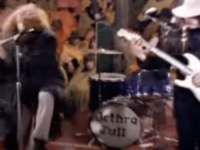Mick Abrahams rose to instant fame as a member of Jethro Tull, helping craft a debut album in This Was that memorably melded blues with progressive rock. “Cat’s Squirrel” from that 1968 project would later appear during concerts for Abrahams’ post-Tull band Blodwyn Pig. Along the way, Abrahams provided a rare non-Ian Anderson vocal on a Jethro Tull song, for “Move On Alone,” and later collaborated with Anderson on solo projects. The guitarist also formed an offshoot band, called This Was, that featured all of that era’s Jethro Tull members save for Ian Anderson. More recently, he bounced back from health issues to release a new studio effort, titled Revived! Abrahams joined Steve Elliott for a Something Else! Sitdown to discuss those early days with Tull, subsequent projects including Blodwyn Pig, and Abrahams’ new album …
STEVE ELLIOTT: I wanted to congratulate you on the release of your latest album Revived!, which arrived in 2015 after some real life health concerns. I was so happy to hear that you were returning to music on your own terms.
MICK ABRAHAMS: Thank you very much; my pleasure.
STEVE ELLIOTT: The album included the first-ever performance between you and your successor as Jethro Tull guitarist, Martin Barre, on the Johnny Kidd and the Pirates’ classic “I Can Tell.” How did it feel to collaborate with Martin after all of these years?
MICK ABRAHAMS: Martin Barre is a wonderful guitar player and a great friend of mine. Need I say any more?
STEVE ELLIOTT: One guy in particular on Revived! who that stood out for me is vocalist Peter Eldridge. He sounds almost exactly like you did back in 1970 with Blodwyn Pig. I loved his vocal performance on album opener “Summer Day.”
MICK ABRAHAMS: Great guy, great vocalist, and I chose him for exactly the reasons that you have said.
STEVE ELLIOTT: I miss hearing your distinctive lead vocals and lead guitar throughout the whole album, as you did with Blodwyn Pig. Your voice and guitar really did sound revived on this new album. When you go in and to record your next album, do you think you will do all of the lead vocals and lead guitar playing?
MICK ABRAHAMS: If I’m up to it, but I think I like good diversity of different voices.
STEVE ELLIOTT: What do you remember about your pre-Jethro Tull band, McGregor’s Engine? Were there any recordings ever made?
MICK ABRAHAMS: Sadly, there are no recordings of McGregor’s Engine. At least, I haven’t found any yet.
STEVE ELLIOTT: Your 1968 debut single for Jethro Tull was “Sunshine Day,” a wonderful upbeat song on a summer day. I love it; what do you think of “Sunshine Day”?
MICK ABRAHAMS: The production by Derek Lawrence is great. I still like it.
STEVE ELLIOTT: “Love Story,” from 1968, is a powerful performance from everyone in the band, and I think a real blueprint of things to come for Jethro Tull’s classic sound.
MICK ABRAHAMS: Someone played a guitar solo to me the other day, and I liked it. I then asked him where he got it from and he said, “It is you!” Doh! It was the solo from “Love Story.”
STEVE ELLIOTT: You’ve said that This Was is the definitive Jethro Tull album – and not just because you’re on it. It’s hard to argue with that point, but I’d also throw in there the equally the Stand Up album, which came out after you left. Both are very strong. Your performances on that first Tull album are excellent, and I – like most early Tull fans – missed you not being in the band after 1968.
MICK ABRAHAMS: Looking back, not only was it the right time for Tull and I to part company, but it gave an intro to a great guitarist and all round nice guy, Martin Barre, to inject new blood into the band.
STEVE ELLIOTT: You didn’t waste too much time in putting together an all-new band after leaving Jethro Tull in late ‘68. You formed the fantastic band Blodwyn Pig in 1969. How did you guys first get together and where did you find that band name ?
MICK ABRAHAMS: The band was formed from people I already knew and wanted to play with. The name just came out from a nutty friend called Graham Waller who, after hearing us rehearse one day, simply said to us on his way out of the room: “Thou shalt evermore be known as Blodwyn Pig!” We all broke up laughing, as you can imagine. I asked where he was going and he said, “I’m going to become a Buddhist monk, as he did!” He came back a year later saying it was no good, because the place was infested with snakes and the abbot wouldn’t let him have his favorite breakfast of cornflakes! He played piano on a couple of numbers, as I recall, and vanished. The last we heard, he is living somewhere in France. I am led to believe that the words Blodwyn Pig come from the poem by the famous poet, Dylan Thomas and, the play named Under Milk Wood.
STEVE ELLIOTT: The first Blodwyn Pig album, 1969’s Ahead Rings Out, is a great classic debut – much like the first Jethro Tull album was. What did you want to get across and achieve with Blodwyn Pig as a band that maybe you couldn’t do with Tull?
MICK ABRAHAMS: My own stuff, I guess!
STEVE ELLIOTT: The second Blodwyn Pig album, 1970’s Getting to This, rocks pretty hard and expands the length of some of the songs, with the “San Francisco Sketches” suite being a pretty good example. The album also contains “See My Way,” which is another unbelievable pile-driving rocker and was one of the highlights of your live shows. “Toys’ is a beautiful, poignant and touching acoustic ballad, and as good as “The Change Song” from the first album.
MICK ABRAHAMS: I was off my nut when I wrote “Toys,” but thanks for liking it. I prefer “The Change Song,” I think.
STEVE ELLIOTT: “Variations On Nainos” is a wonderfully funky breezy jazz rocker, and a prime example of your style and Jack Lancaster’s flute prowess coming effortlessly to forefront – plus a dash of your funny sense of humor.
MICK ABRAHAMS: Again, off my head in the recording studio. The producer bet me that I couldn’t sing a verse with my head in a bucket of water, so I did – then, jokingly they said, bet you can’t double track it. So, I did! More, spell the name Nainos backwards and you see my silly sense of humor.
STEVE ELLIOTT: Unbelievably, the fabulous unreleased blues rocker “Meanie Mornay” was left off of the Getting to This album, before finally arriving as part of the 2006 reissue of Ahead Rings Out. Why wasn’t it released back in 1970?
MICK ABRAHAMS: I truly have no idea. You should ask the record company people; they know everything!
STEVE ELLIOTT: What did your producer Andy Johns bring to the Blodwyn Pig albums?
MICK ABRAHAMS: Rest in peace, the very best I have ever worked with. He brought absolutely everything to those records. He was a really nice guy. Very talented, and Blodwyn Pig owes him a debt of gratitude.
STEVE ELLIOTT: So, what in your mind caused Blodwyn Pig to break up after two albums? On the surface, you seemed to have everything going for you – great songs, fab musicianship, genuine talent and exciting performances.
MICK ABRAHAMS: People being idiots, management not caring, and aliens, maybe? Who cares? It’s gone; leave it gone.
STEVE ELLIOTT: After Blodwyn Pig, you then briefly formed Wommet in 1971 which then morphed into The Mick Abrahams Band after some personnel changes. What you do think of 1972’s At Last? I really don’t know what to make of it.
MICK ABRAHAMS: What a crap album. I think this album failed simply because there were just too many people sticking their own oars in the water, and it ruined it for me.
STEVE ELLIOTT: The original 1968 Jethro Tull lineup held a brief reunion in 2001, performing a couple of the old songs live for the Tull DVD Living With The Past. How was it for you to play those guys again after all of these years?
MICK ABRAHAMS: That was good fun doing that. We all went into an old-fashioned club in Warwick, where we were filmed and recorded live in front of an audience of Tull fans who were told to clap lightly and disappointingly – just like in the first days when we played these types of clubs. It was hard going until Tull had a magic breakthrough at the Sunburn Blues Festival.
STEVE ELLIOTT: Tell us about your experience at the special 50th anniversary benefit concert, held on May 9, 2016 in England at the Borderline Club.
MICK ABRAHAMS: It was truly incredible!
STEVE ELLIOTT: I want to thank you for all of the great music that you’ve recorded with Jethro Tull, Blodwyn Pig, and as solo artists. You are a true original, Mick Abrahams.
MICK ABRAHAMS: You’re very kind! Thank you all so much.
- How the Bee Gees Overcame It All to Produce the Magical ‘Odessa’ - March 29, 2024
- How an ‘Antique French Garage Band’ Nailed the Whole Soul Music Vibe - November 27, 2022
- Kyte – ‘Kyte’ (2009): Forgotten Series - April 9, 2022



